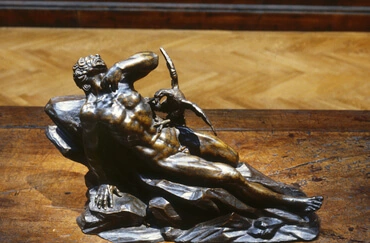Apocalypse Revealed # 788
788. 18:19 "And they put dust on their heads and cried out, weeping and mourning, and saying, 'Woe, woe, that great city!'" This symbolizes their interior and exterior grief and mourning, which is a lamentation that so eminent a religion was completely destroyed and condemned.
Putting dust on their heads symbolizes their interior and exterior grief and mourning over the destruction and damnation, as we will show below. To cry out, weeping and mourning, symbolizes their exterior grief and mourning - to weep symbolizing a mourning of the soul, and to grieve a grief of the heart. "Woe, woe, that great city!" symbolizes a grievous lamentation over the destruction and damnation. That "woe" symbolizes a lamentation over a calamity, misfortune, or damnation, and that "woe, woe," therefore symbolizes a grievous lamentation, may be seen in nos. 416, 769, 785; and that the city symbolizes the Roman Catholic religion may be seen in no. 785 and elsewhere.
That putting dust on the head symbolizes an interior grief and mourning over a destruction and damnation is clear from the following passages:
They will cry bitterly and cast dust on their heads; they will roll about in ashes. (Ezekiel 27:30)
(The daughters) of Zion sit on the ground...; they have cast dust on their heads... (Lamentations 2:10)
(Job's friends) rent their tunics and sprinkled dust upon their heads... (Job 2:12)
Come down and sit in the dust, O virgin daughter of Babylon; sit on the ground without a throne... (Isaiah 47:1)
And so on elsewhere.
The people put dust on their heads when they grieved deeply, because dust symbolized something damned, as is apparent from Genesis 3:14, Matthew 10:14, Mark 6:11, Luke 10:10-12, and dust on the head represented the people's acknowledgment that of themselves they were damned, and thus their repentance, as in Matthew 11:21, Luke 10:13.
Dust symbolizes something damned because the land over the hells in the spiritual world consists of nothing but dust, without grass or plants.
Cry

As with most common verbs, the spiritual meaning of “crying” or “crying out” (meaning a shout or wail, not weeping) is highly dependent on context. Who is crying out? To whom? Why? In most cases, though, crying has to do with speaking falsely, and of the emotions arising from the conflict between truth and falsity. When people cry out in distress it is most often an indication that they are being overwhelmed by false ideas. In other cases – especially regarding more joyful cries – it is a celebration of the triumph of truth.






